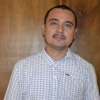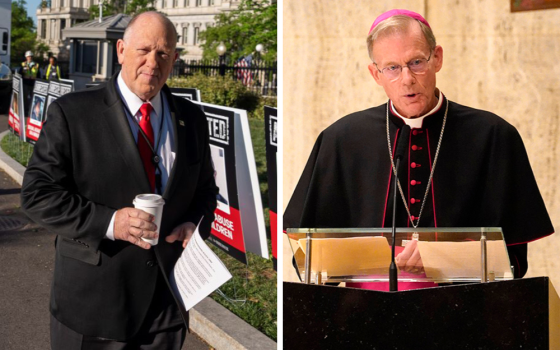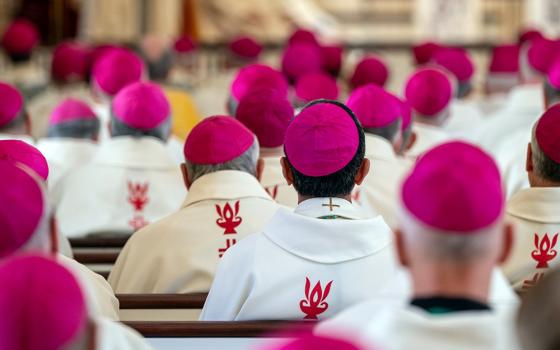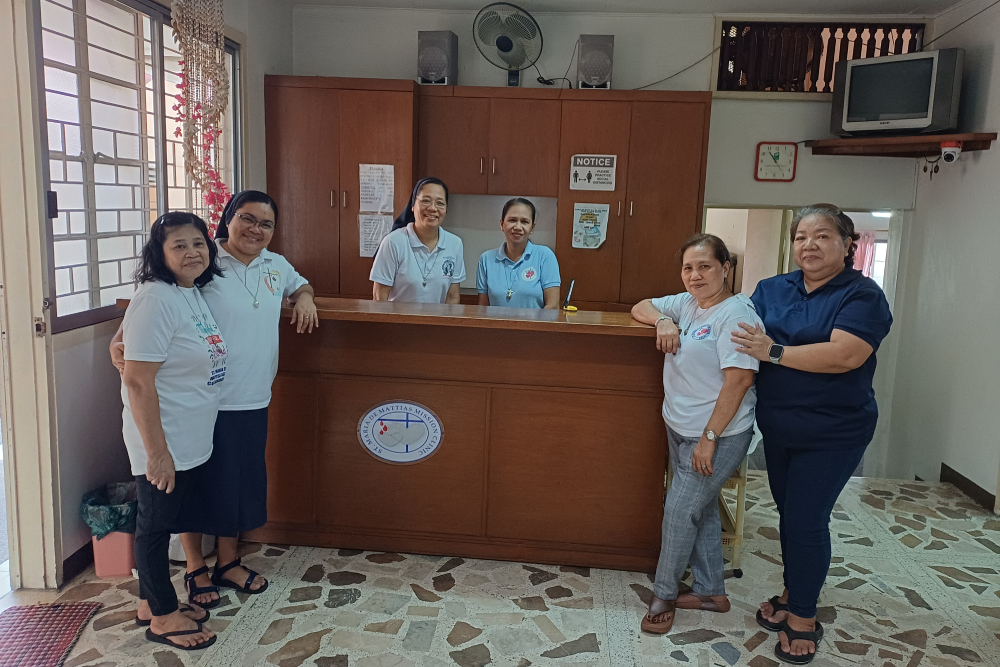
Srs. Flor Montoja Manga (second from left) and Linlee Vios (center) of the Adorers of the Blood of Christ share smiles with their lay collaborators at the St. Maria De Mattias Mission Center in Quezon City. Together, they run the clinic that has served the poor for more than 30 years through faith, compassion, and community partnership. (Oliver Samson)
Every Monday morning, a line forms outside a modest clinic located on a narrow street in Quezon City. In front, yellow tricycles are parked close together. The drivers wait for passengers or for their turn for a check-up. Mothers cradle coughing children while elderly men rest on benches under the morning sun.
Inside, Sr. Linlee Vios of the Adorers of the Blood of Christ meets people who have found care, comfort and compassion at the St. Maria De Mattias Mission Center over the past 31 years.
For three decades, this small but steadfast mission clinic has served the poor and marginalized of metro Manila, offering not just medical care but dignity, formation and family.
"The need of the poor keeps us motivated," said Sr. Flor Montoja Manga, the congregation's mission coordinator in the Philippines. "That is our mission — to respond to the cry of the needy. Health is a basic need, and when you help the poor with their health, you help them live better lives."
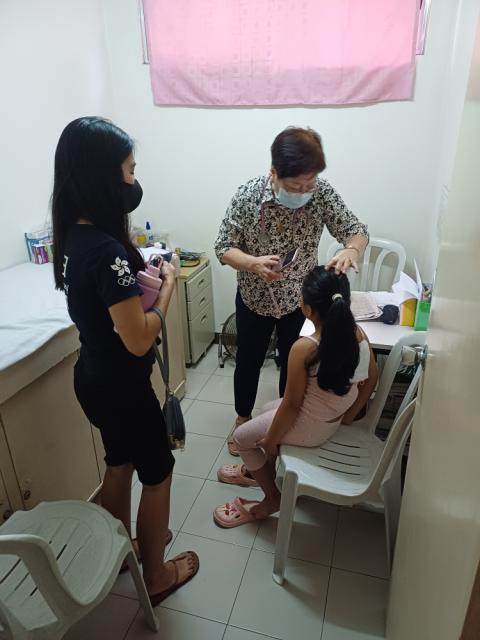
Dr. Lourdes S.M. Sarmiento checks a young patient at the St. Maria De Mattias Mission Center in Culiat, Quezon City. The volunteer doctor has been serving at the clinic run by the Adorers of the Blood of Christ sisters since the 1990s. (Oliver Samson)
The clinic is open three half days a week — Mondays, Wednesdays and Fridays — yet it serves an average of 40 patients a day.
Most come from nearby informal squatter settlements in Quezon City, though some travel from almost 70 km (about 43 miles) from Bulacan, where the government relocated them years ago due to housing shortages.
"Even those relocated far away still return for treatment, especially those under the government's tuberculosis program," Vios said.
The clinic's small pharmacy has been a lifeline for the community. It nearly closed in 2011 due to competition from commercial generic drugstores.
"But the people asked us not to close," Vios said. "We adjusted the prices, and they became even cheaper. When someone really cannot afford medicine, we give it for free." Donations of medicine from benefactors make this possible.
Each patient contributes a ₱50 ($0.84 USD) registration fee, which helps cover maintenance and the volunteer doctor's transportation. Checkups and consultations are free of charge.
"We believe it should not be a dole out," said Vios. "Even if you are poor, you have to do your share. This clinic has gone this far because of their contribution. We remind them that this is their clinic."
The clinic's longtime volunteer physician, Dr. Lourdes S.M. Sarmiento, an obstetrician-gynecologist, has been serving since the clinic's early years.
"When the Italian nuns started this clinic in 1993, I was already seeing patients here," she told Global Sisters Report. "At that time, it was open only on Sundays. There wasn't a regular schedule like now."
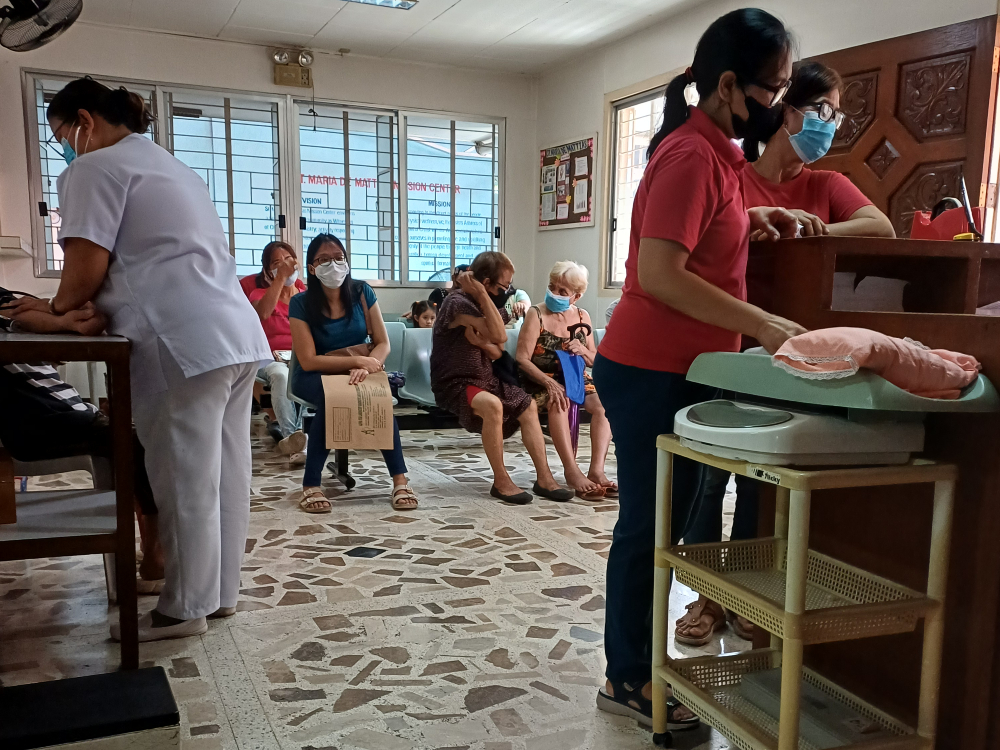
Patients wait for their turn at the St. Maria De Mattias Mission Center in Quezon City. The clinic, run by the Adorers of the Blood of Christ sisters, provides free consultations and affordable medicine to hundreds of low-income families each month. (Oliver Samson)
Sarmiento has continued to volunteer since finishing medical school.
Most of the patients, she noted, come with common ailments: cough, hypertension, diabetes, parasites and skin diseases.
"I do minor surgeries here, like circumcision, incision and drainage, and treatment for sepsis," she said. "When I can't come, the sisters call another doctor."
For Sarmiento, her service at the clinic is a response to vocation as much as profession.
"The sisters have created a spirit of genuine mission here," she said. "You see faith at work — not just in the nuns, but in the patients and volunteers too."
The clinic has been a blessing for Justine Mercado, a young mother from a nearby squatter community.
"My son was only 3 years old when I first brought him here," she said. "He's 6 now. Each time he gets sick, I bring him here for treatment."
She appreciates the accessibility and care the clinic provides.
"Outside, a checkup costs ₱500 ($8.50 USD)," she said. "The medicine here is cheaper, and the doctor is very good. This clinic is a big help to us."
For families like hers, the clinic is more than a place of healing; it's a refuge in a city where poverty hides beneath modern buildings and crowded streets.
The sisters' work is sustained by lay collaborators who volunteer their time and energy. Among them is Bing Ariola, who manages the pharmacy.
"I dispense medicine to patients after [the doctor] checks them," she said. "Our medicines are cheaper; an anti-allergy tablet costs only ₱3 ($0.05 USD) here, while outside it's ₱9 ($0.15 USD). Some residents even buy their vitamins here because they know it's affordable."
Collaborators like Ariola come from the same neighborhoods as the patients, forming a bridge between the clinic and the community. They receive monthly formation and spiritual guidance from the sisters.
Advertisement
"Our collaborators are also economically challenged," said Vios, "but through formation, they find purpose in life. This community has become their family."
They also receive small monthly assistance from benefactors — not in goods, but in cash, so they can choose what their households most need.
"We regard them as mission partners," said Manga. "We create programs not based on our will, but on the needs of the people we serve."
The health center is more than a clinic. On Saturdays, it becomes a venue for children's catechism, while on other days it hosts youth gatherings and seminars on mental health and social media.
"It's a multipurpose mission center," said Manga. "It's also a place for formation and advocacies."
Some of the youth once helped by the congregation now give back as benefactors.
"They offer assistance when they have more than enough," said Vios. "They've become witnesses that small acts of kindness can multiply."
Despite being located in one of metro Manila's wealthiest cities, poverty surrounds the mission center.
"You cannot feel the wealth of the city in the lives of the poor here," Manga said. "They are hardworking: tricycle drivers, construction workers, mall employees — but contractual labor leaves them struggling to meet even daily food needs."
After 31 years, the sisters see their mission as a living testimony of divine providence.
"There were times when we had nothing, but suddenly help arrived," said Vios. "God provides — through benefactors, volunteers and the people themselves. We may not have much, but what we have, we share with love. And that sustains everything."
